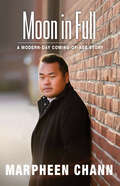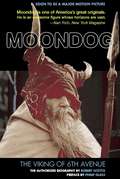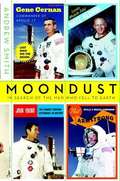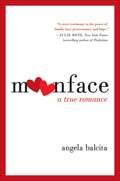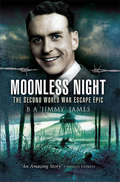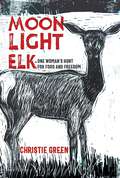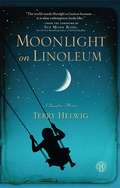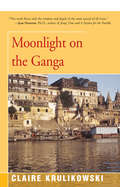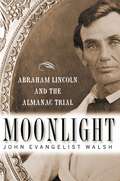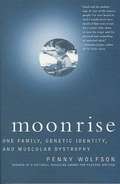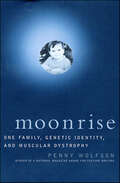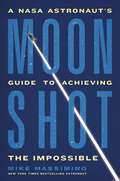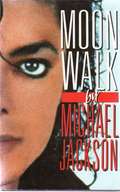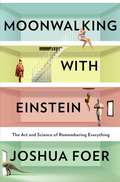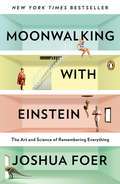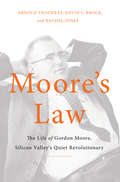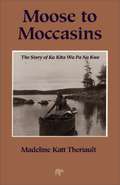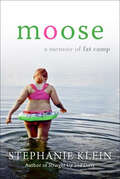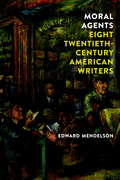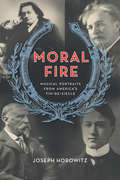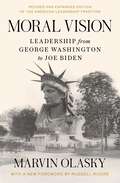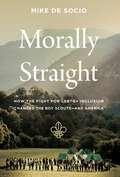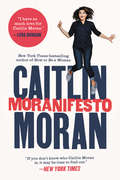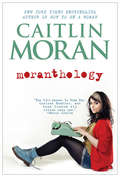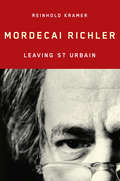- Table View
- List View
Moon in Full: A Modern-Day Coming-of-Age Story
by Marpheen ChannMoon in Full, a contemporary coming-of-age story, shines light on one young man’s search for truth and compassion in a complicated era as it unwinds the deep-seated challenges we all face finding our authentic voice and true identities. Author Marpheen Chann’s heart-warming journey weaves through housing projects and foster homes; into houses of worship and across college campuses; and playing out in working-class Maine where he struggles to find his place. Adopted into in a majority white community, Chann must reconcile his fears and secret longings as a young gay man with the devoutly religious beliefs of his new family. Chann, a second-generation Asian American, recounts what he has learned, what he has lost, and what he has found during his evolution from a hungry refugee’s son to religious youth to advocate for acceptance and equality.
Moondog
by Philip Glass Robert Scotto<P>The basis of a full-length documentary."Moondog is one of America's great originals."-Alan Rich, New York Magazine <P>Here is a revised edition of a book that celebrates one of the most improbable lives of the twentieth century: a blind and homeless man who became the most famous eccentric in New York and who, with enormous diligence, rose to prominence both in major label pop music recordings in addition to symphonic concerts of his compositions. <P>This edition of Moondog will soon be seen a as a feature documentary titled The Viking of 6th Avenue directed by Holly Elson and produced by Hard Working Movies.Born Louis Thomas Hardin in 1916, Moondog first made an impression in the late 1940s when he became a mascot of The New York Philharmonic at Carnegie Hall. His unique, melodic compositions were released on the Prestige jazz label. In the late 1960s the Viking-garbed Moondog was a pop music sensation on Columbia Records. <P>Moondog's compositional style influenced his former roommate Philip Glass, whose preface appears in the book. Moondog's work transcends labels and redefines the distinction between popular and high culture. <P>A wide-ranging compilation of Moondog recordings, which includes four Madrigals played by Philip Glass, Steven Reich, Jon Gibson, and Moondog himself, are offered as free downloads for every purchaser of this biography.
Moondust: In Search of the Men Who Fell to Earth
by Andrew SmithThe Apollo Moon landings have been called the last optimistic act of the twentieth century. Twelve astronauts made this greatest of all journeys, and all were indelibly marked by it. In "Moondust", journalist Andrew Smith reveals the stories of the nine still living men caught between the gravitational pull of the Moon and the Earth's collective dreaming: Here, we relive the flashbulbs, the first shocking glimpse of Earth from space, the sense of euphoria and awe. This was the first global media event, after all, and the astronauts were its superstars. They had been schooled by NASA for every eventuality in deep space but were completely unprepared for fame. On their return, they struggled to balance notoriety with a spaceman's frugal paycheck. These perfect specimens of mind and body were, ultimately, only human beings thrust into an impossibly intense spotlight. Possibilities bloomed, and marriages crumbled under the strain. And it wasn't just the astronauts who'd changed; the world was changing, too. As the Apollo program wound down, the wild and happy experimentation's of the sixties gave way to the cynicism and self-doubt of the seventies, and the Moon-walkers faced what was, in some ways, their greatest challenge: how to find meaning in life when the biggest adventure you could possibly have was a memory. Some traded on past glories; others tried to move on. Some found God; some sought oblivion; some reinvented themselves and discovered a measure of happiness in a completely unexpected place. Andrew Smith sees them through the eyes of the boy who flung down his bike on a summer evening to hear Neil Armstrong utter his fateful words -- and through the eyes of a grown man balancing myth against reality and finding the truth infinitely richer and more moving.
Moonface: A True Romance
by Angela Balcita“Angela Balcita's love story takes a couple of artsy wanderers off the road and into the bright, scary world of transplants, dialysis, and neonatal intensive care.” —Marion Winik, author of The Glen Rock Book of the DeadFrom the pages of the New York Times’ Modern Love column comes one woman’s moving and uproarious story of how love and laughter rescued her from life-threatening illness. Angela Balcita’s cathartic memoir of finding love while wrestling with kidney failure will strike a chord with anyone yearning for a poignant, true-to-life romance…with a real fairy tale ending.
Moonless Night: The Second World War Escape Epic
by B A James“James is the sort of person they write legends about. A participant in the mass escape that was the basis for the movie The Great Escape.” —AudioFileFrom the moment he was shot down to the final whistle, Jimmy James’ one aim as a POW of the Germans was to escape. Moonless Night describes his experiences and those of his fellow prisoners in the most gripping and thrilling manner. The author made more than twelve escape attempts including his participation in The Great Escape, where fifty of the seventy-six escapees were executed in cold blood on Hitler’s orders.On re-capture, James was sent to the infamous Sachsenhausen Concentration Camp where, undeterred, he tunneled out. That was not the end of his remarkable story.Moonless Night has strong claim to be the finest escape story of the Second World War.“An amazing story.” —The Sunday Express
Moonlight Elk: One Woman's Hunt for Food and Freedom
by Christie GreenChristie Green learned to hunt in order to complement the food she grew in her New Mexico garden. As an act of practical agency this fulfilled her needs, yet a restlessness stirred within. She longed for a life defined by something deeper than weekly schedules, work roles, and cultural norms. Could she travel beyond the supposed domain of women and venture into the world of animals, into the wild, where men were said to prevail?Outside the grip of the human realm, the moon beckons to Green to go beyond. Here, hunting in the wild, the moon cycles through her, rising and falling at dawn and dusk, whispering messages from the dark side. Rather than circle the hot insistence of a masculine sun, Green begins to attune to the more elusive, mysterious murmuration of the moon.Animals and dreams, lunar partners, choreograph Green through time and space. She longs to dream, toil, live and love at the edges of the fertile ecotones where she can withdraw inward, retreat like an animal into hiding, and then come into full, radiant view on her own terms.Layer by layer, hunt by hunt, Green peels away societal skins that adhere to a prescribed grid, a manufactured tick of time, a picture of perfection. Tracking and tracing, moving in darkness, watching, smelling, listening, and following the animals, Green sheds the burdens of her domestic self and witnesses the animals defying reason as they walk her into their world, ambling her along, straddling night and day, waking and sleeping. Through them, definitions of gender dissolve and boundaries blur. In the process, Green eclipses western society’s definitions of her as a woman, mother, lover, and entrepreneur, courageously birthing her own independence through a profound connection to the animals and the places they call home.What she sought from these animals was food. What she found was freedom.
Moonlight on Linoleum: A Daughter's Memoir
by Terry HelwigNow in paperback—in the bestselling tradition of The Glass Castle and The Liar’s Club comes the captivating memoir of a young girl forced by her mother’s instability to care for her siblings.Even if others abandon you, you must never abandon yourself. This simple truth became Terry Helwig’s lifeline as she was forced to grow up too soon. Terry grew up the oldest of six girls in the big-sky country of the American Southwest, where she attended twelve schools in eleven years. Helwig’s stepfather Davy, a good-hearted and loving man, proudly purchased a mobile home to enable his family to move more easily from one oil town to another, where Davy eked out a living in the oil fields. Terry’s mother, Carola Jean, a wild rose whose love often pierced those who tried to claim her, had little interest in the confines of home and motherhood. In Davy’s absence, she sought companionship in local watering holes—a pastime she dubbed “visiting Timbuktu.” She repeatedly left Terry in charge of the household and her five younger sisters. Despite Carola Jean’s genuine attempts to “better herself,” her life spiraled ever downward as Terry struggled to keep the family whole. In the midst of transience and upheaval, Terry and her sisters forged an uncommon bond of sisterhood that withstood the erosion of Davy and Carola Jean’s marriage. But ultimately, to keep her own dreams alive, Terry had to decide when to hold on to what she loved and when to let go. Unflinching in its portrayal, yet told with humor and compassion, Terry Helwig’s luminous memoir, Moonlight on Linoleum, explores a family’s inner and outer landscapes of hope, despair, and redemption. It will make you laugh, cry, and hunger for more.
Moonlight on the Ganga
by Claire KrulikowskiIn this reflective and enjoyable India travel memoir, "hooks of fears" claw at author Claire Krulikowski on her first morning's awakening in India, a land she'd never planned to visit. However, in Rishikesh she hears the call of Ma Ganga, the sacred Ganges River, and accepts its enticing invitation to leave everything she knows behind. Diving into the river of life teeming around her, including meetings with lepers, wounded monkeys, swamis, stalkers, pilgrims, shopkeepers, holy cows, and more, Krulikowski steps outside her beliefs of how things "should be," trusting life and everything in it! She comes to know happiness and peace moment-by-moment. Presented in exquisite vignettes, enjoy these tales of spirit that are seemingly channeled by the sacred river.
Moonlight: Abraham Lincoln and the Almanac Trial
by John Evangelist WalshOn August 29, 1857, in the light of a three-quarter moon, James Metzger was savagely beaten by two assailants in a grove not far from his home. Two days later he died and his assailants, James Norris and William Armstrong, were arrested and charged with his murder. Norris was tried and convicted first. As William "Duff" Armstrong waited for his trial, his own father died. James Armstrong's deathbed wish was that Duff's mother, Hannah, engage the best lawyer possible to defend Duff. The best person Hannah could think of was a friend, a young lawyer from Springfield by the name of Abraham Lincoln. Lincoln took the case and with that begins one of the oddest journeys Lincoln took on his trek towards immortality. What really happened? How much did the moon reveal? What did Lincoln really know? Walsh makes a strong case for viewing Honest Abe in a different light in this tale of murder and moonlight.Moonlight is a 2001 Edgar Award Nominee for Best Fact Crime.
Moonrise: One Family, Genetic Identity, and Muscular Dystrophy
by Penny WolfsonIn this riveting and thought-provoking memoir about her family, her son Ansel, and his progressive disability, Penny Wolfson embarks on a quest that explores special education, giftedness, prenatal testing, and the genes she shares with her mother, sisters, and son. While Moonrise is an eloquent narrative of one family, it also asks profound questions about our genetic selves.
Moonrise: One Family, Genetic Identity, and Muscular Dystrophy
by Penny WolfsonMoonrise is Penny Wolfson's first-person account of her family, her son Ansel, and his progressive disability, caused by the genetic disease Duchenne muscular dystrophy. The journey begins when he is born and deemed a particularly beautiful and magical baby, continues with the alarming possibility, at the age of two, of "wrongness," takes us through the diagnosis of disease and prognosis of early death, and brings us to his adolescence, where his parents are never sure if the moon is rising or setting over his life. As she traces her son's development and the impact of his disability on her worldview, she embarks on a quest to understand scientific advances and their implications. (The gene was isolated at approximately the time Ansel was diagnosed.) She also explores special education, giftedness, prenatal testing, and the genetic links she shares with her mother, sisters, and son. Questions about the disease-causing mutation persist: What does knowledge of the self on a molecular level mean? Is genetic self-knowledge our goal now, much as knowledge of the psyche was in the last century? Moonrise is an essential contribution to the dialogue about genetics, as well as a deeply human story about a remarkable child and his family.
Moonshot: A NASA Astronaut’s Guide to Achieving the Impossible
by Mike MassiminoLearn the NASA Astronaut mindset to solve problems, provide leadership in the face of adversity, and never give up on the pursuit of your wildest dreams. Mike Massimino achieved his dream of exploring space—now he distills stories and insights from NASA into an actionable guide to accomplish your biggest goals. Mike reveals how to make possible the seemingly impossible—on Earth. Written with characteristic wit and a big heart, Mike identifies ten hard-earned lessons of spaceflight and other life experiences, including: • One in a Million Is Not Zero: The odds are against you. Do it anyway. • The Thirty-Second Rule: You&’re going to make mistakes. Learn how to deal with them. • Be Amazed: The universe is an incredible place. Stop what you&’re doing and look around. • Know When to Pivot: Change is inevitable. Accept and embrace it. We all have our own personal &“moon shots&” we&’d like to take in life, but as mission control will tell you, doing one big thing really means getting a thousand little things right along the way. Moonshot is the book that will show you how to do just that, and help set you on the right path to achieve your own personal and professional dreams.
Moonwalk
by Michael JacksonThe rock superstar offers a candid, inside look at his phenomenal career, private and family life, dreams and goals, friendships, personal relationships, and the painful isolation of fame.
Moonwalking with Einstein: The Art and Science of Remembering Everything
by Joshua FoerThis book draws on cutting-edge research, a surprising cultural history of memory, and venerable tricks of the mentalist's trade to transform our understanding of human remembering. Moonwalking with Einstein brings Joshua Foer to the apex of the U.S. Memory Championship and readers to a profound appreciation of a gift we all possess but that too often slips our minds.
Moonwalking with Einstein: The Art and Science of Remembering Everything
by Joshua FoerThe blockbuster phenomenon that charts an amazing journey of the mind while revolutionizing our concept of memory An instant bestseller that is poised to become a classic, Moonwalking with Einstein recounts Joshua Foer's yearlong quest to improve his memory under the tutelage of top "mental athletes. " He draws on cutting-edge research, a surprising cultural history of remembering, and venerable tricks of the mentalist's trade to transform our understanding of human memory. From the United States Memory Championship to deep within the author's own mind, this is an electrifying work of journalism that reminds us that, in every way that matters, we are the sum of our memories. .
Moore's Law: The Life of Gordon Moore, Silicon Valley's Quiet Revolutionary
by Rachel Jones Arnold Thackray David C. BrockOur world today--from the phone in your pocket to the car that you drive, the allure of social media to the strategy of the Pentagon--has been shaped irrevocably by the technology of silicon transistors. Year after year, for half a century, these tiny switches have enabled ever-more startling capabilities. Their incredible proliferation has altered the course of human history as dramatically as any political or social revolution. At the heart of it all has been one quiet Californian: Gordon Moore. At Fairchild Semiconductor, his seminal Silicon Valley startup, Moore--a young chemist turned electronics entrepreneur--had the defining insight: silicon transistors, and microchips made of them, could make electronics profoundly cheap and immensely powerful. Microchips could double in power, then redouble again in clockwork fashion. History has borne out this insight, which we now call "Moore’s Law”, and Moore himself, having recognized it, worked endlessly to realize his vision. With Moore’s technological leadership at Fairchild and then at his second start-up, the Intel Corporation, the law has held for fifty years. The result is profound: from the days of enormous, clunky computers of limited capability to our new era, in which computers are placed everywhere from inside of our bodies to the surface of Mars. Moore led nothing short of a revolution. In Moore’s Law, Arnold Thackray, David C. Brock, and Rachel Jones give the authoritative account of Gordon Moore’s life and his role in the development both of Silicon Valley and the transformative technologies developed there. Told by a team of writers with unparalleled access to Moore, his family, and his contemporaries, this is the human story of man and a career that have had almost superhuman effects. The history of twentieth-century technology is littered with overblown "revolutions. ” Moore’s Law is essential reading for anyone seeking to learn what a real revolution looks like.
Moose to Moccasins: The Story of Ka Kita Wa Pa No Kwe
by Madeline Katt TheriaultHaving been born in a tent on Bear Island, Lake Temagami, in 1908, Madeline Katt Theriault could recall an earlier independent and traditional First Nations lifestyle. In this book, the late author proudly tells of her youth and coming of age by sharing her vivid memories and drawing on exceptional old family photographs. In her own words, she writes of a time long ago – a time that was difficult, but not without personal rewards. "Moose to Moccasins is a remarkable account by Madeline Theriault, or Ka Kita Wa Pa No Kwe (’Wise Day Woman’), who, in her own words, has lived ’in both cultures, Indian and white man’s.’ From her birth in the Temagami region in 1908, to her life in North Bay in the 1970s and 1980s, she takes the reader on a remarkable journey. We travel through the bush with her as a young girl. ’We killed animals only when needed and we could drink water anywhere. Our camp was always fresh; fresh balsam branches for our beds and floors in the camp. Such lively smells and the air was pure.’ We step back into another century, into another universe. There is a wealth of information in these pages about a people, and a way of life, about which most non-Natives know almost nothing." – Donald B. Smith, Professor of History, University of Calgary
Moose: A Memoir of Fat Camp
by Stephanie KleinStephanie Klein was an eighth grader with a weight problem. It was a problem at school, where the boys called her "Moose," and it was a problem at home, where her father reminded her, "No one likes fat girls." After many frustrating sessions with a nutritionist known as the fat doctor of Roslyn Heights, Long Island, Klein's parents enrolled her for a summer at fat camp. Determined to return to school thin and popular, without her "lard arms" and "puckered ham," Stephanie embarked on a memorable journey that would shape more than just her body. It would shape her life.
Moral Agents: Eight Twentieth-Century American Writers
by Edward MendelsonA deeply considered and provocative new look at major American writers--including Saul Bellow, Norman Mailer, and W.H. Auden--Edward Mendelson's Moral Agents is also a work of critical biography in the great tradition of Plutarch, Samuel Johnson, and Emerson. Any important writer, in Mendelson's view, writes in response to an idea of the good life that is inseparable from the life the writer lives. Fusing biography and criticism and based on extensive new research, Moral Agents presents challenging new portraits of eight writers--novelists, critics, and poets--who transformed American literature in the turbulent twentieth century. Eight sharply distinctive individuals--inspired, troubled, hugely ambitious--who reimagined what it means to be a writer. There's Saul Bellow, a novelist determined to rule as a patriarch, who, having been neglected by his father, in turn neglected his son in favor of young writers who presented themselves as his literary heirs. Norman Mailer's extraordinary ambition, suppressed insecurity, and renegade metaphysics muddled the novels through which he hoped to change the world, yet these same qualities endowed him with an uncanny sensitivity and deep sympathy to the pathologies of American life that make him an unequaled political reporter. William Maxwell wrote sad tales of small-town life and surrounded himself with a coterie of worshipful admirers. As a powerful editor at The New Yorker, he exercised an enormous and constraining influence on American fiction that is still felt today. Preeminent among the critics is Lionel Trilling, whose Liberal Imagination made him a celebrity sage of the anxiously tranquilized 1950s, even as his calculated image of Olympian reserve masked a deeply conflicted life and contributed to his ultimately despairing worldview. Dwight Macdonald, by contrast, was a haute-WASP anarchist and aesthete driven by an exuberant moral commitment, in a time of cautious mediocrity, to doing the right thing. Alfred Kazin, from a poor Jewish émigré background, remained an outsider at the center of literary New York, driven both to escape from and do justice to the deepest meanings of his Jewish heritage. Perhaps most intriguing are the two poets, W.H. Auden and Frank O'Hara. Early in his career, Auden was tempted to don the mantle of the poet as prophet, but after his move from England to America he lived and wrote in a spirit of modesty and charity born out of a deeply idiosyncratic understanding of Christianity. O'Hara, tireless partygoer and pioneering curator at MoMA, wrote much of his poetry for private occasions. Its lasting power has proven to be something different from its avant-garde reputation: personal warmth, individuality, rootedness in ancient traditions, and openness to the world.
Moral Fire: Musical Portraits from America's Fin de Siècle
by Joseph HorowitzJoseph Horowitz writes in Moral Fire: "If the Met's screaming Wagnerites standing on chairs (in the 1890s) are unthinkable today, it is partly because we mistrust high feeling. Our children avidly specialize in vicarious forms of electronic interpersonal diversion. Our laptops and televisions ensnare us in a surrogate world that shuns all but facile passions; only Jon Stewart and Bill Maher share moments of moral outrage disguised as comedy." Arguing that the past can prove instructive and inspirational, Horowitz revisits four astonishing personalities--Henry Higginson, Laura Langford, Henry Krehbiel and Charles Ives--whose missionary work in the realm of culture signaled a belief in the fundamental decency of civilized human nature, in the universality of moral values, and in progress toward a kingdom of peace and love.
Moral Vision: Leadership from George Washington to Joe Biden
by Marvin OlaskyWhat makes a leader truly great? Is it simply a matter of management style and personality? Or is it character that matters most? Moral Visions takes an insightful look into America&’s leaders of the past to answer these questions and demonstrates that values and moral convictions are critical to the strength of a nation.Supposedly, we learn about the candidates for the highest office through a series of tests called &“debates,&” which are instead an exchange of soundbites. We can&’t know whether an aspirant to the presidency has the ability to ask good questions or only a suave or belligerent ability to answer them. Moral Vision is a human-interest introduction to American history through studies of nineteen leaders: presidents, almost presidents, a tycoon, a crusading journalist, and even a leading 19th century abortionist. Its lessons can help voters sort through the candidates in 2024 and beyond by measuring them against previous leaders—none of whom was faultless. It shows how the deepest views often grow out of religious belief and influence political goals, racial prejudices, sexual activities, uses of power, and senses of service. In his 1789 inaugural address, George Washington pledged that &“the foundation for national policy will be laid in the sure and immutable principles of private morality.&” Marvin Olasky shows how 19th-century leaders like Thomas Jefferson, Andrew Jackson, and Grover Cleveland partly upheld and partly ignored that promise, and 20th-century leaders like Woodrow Wilson, John F. Kennedy, and Bill Clinton tried to &“compartmentalize&” the private and the public. An extensively updated version of The American Leadership Tradition, Moral Vision is for anyone tired of today&’s textbook tendencies to submerge the role of individuals as big economic and demographic waves roll in. History is more than statistics, economics, and group identities. Human beings are more than paper boats riding the rainfall into gutters.
Morally Straight: How the Fight for LGBTQ+ Inclusion Changed the Boy Scouts?and America
by Mike De SocioThis deeply-reported narrative illuminates the battle for LGBTQ+ inclusion in the Boy Scouts of America, a decades-long struggle led by teenagers, parents, activists, and everyday Americans.Weaving in his own experience as a scout and journalist, Mike De Socio&’s Morally Straight tells a story that plays out over the course of nearly forty years, beginning in an era when gay rights were little more than a cultural sideshow; when same-sex marriage was not even on the radar; and when much of the country was recommitting to conservative social mores. It was during this treacherous time that accidental activists emerged, challenging one of America&’s most iconic institutions in a struggle that would forever change the country&’s view of gay people and the rights they held in society. In Morally Straight we meet James Dale, the poster child of Scouting who took his fight for inclusion to the Supreme Court; Steven Cozza, the 12-year-old scout in California who started a movement for inclusion called Scouting for All; Jennifer Tyrrell, the lesbian den mother whose expulsion from the Scouts reignited the gay membership controversy; Zach Wahls, the son of lesbian moms who led the final push for policy change; and an array of other previously unknown Scouters who played smaller—but no less crucial—roles in the fight for full inclusion. Richly reported and filled with unforgettable people, Morally Straight braids together these characters and brings to life their collective struggle. This is an essential narrative in the American LGBTQ+ rights movement, and a truly American story about the fight for a better future for our nation&’s bedrock youth organization.
Moranifesto
by Caitlin MoranFrom the New York Times bestselling author of How to Be a Woman and Moranthology comes a collection of Caitlin Moran's award-winning London Times columns that takes a clever, hilarious look at celebrities, society, and the wacky world we live in today--including three major new pieces exclusive to this book.When Caitlin Moran sat down to choose her favorite pieces for her new book, she realized that they all shared a common theme--the same old problems and the same old ass-hats. Then she thought of the word 'Moranifesto', and she knew what she had to do...Introducing every piece and weaving her writing together into a brilliant, seamless narrative--just as she did in Moranthology--Caitlin combines the best of her recent columns with lots of new writing unique to this book as she offers a characteristically fun and witty look at the news, celebrity culture, and society. Featuring strong and important pieces on poverty, the media, and class, Moranifesto also focuses on how socially engaged we've become as a society.And of course, Caitlin is never afraid to address the big issues, such as Benedict Cumberbatch and duffel coats. Who else but Caitlin Moran--a true modern Renaissance woman--could deal with topics as pressing and diverse as the beauty of musicals, affordable housing, Daft Punk, and why the Internet is like a drunken toddler? Covering everything from Hillary Clinton to UTIs, Caitlin's manifesto is an engaging and mischievous rallying call for our times.
Moranthology
by Caitlin MoranPossibly the only drawback about the bestsellingHow To Be A Womanwas that its author, Caitlin Moran, was limited to pretty much one subject: being a woman. MORANTHOLOGYis proof that Caitlin can actually be #145;quite chatty#146; about many other things, including cultural, social and political issues which are usually the province of learned professors, or hot-shot wonks #150; and not a woman who once, as an experiment, put a wasp in a jar, and got it stoned. These other subjects include: Caffeine | Ghostbusters | Being Poor | Twitter | Caravans | Obama | Wales | Marijuana Addiction |Paul McCartney | The Welfare State | Sherlock | David Cameron Looking Like Ham | Amy Winehouse | Elizabeth Taylor#146;s Eyes | Michael Jackson#146;s Funeral | #145;The Big Society#146; | Big Hair | Nutter-letters | Failed Nicknames | Wolverhampton | Squirrels#146; Testicles | Sexy Tax | Binge-drinking | Chivalry | Rihanna#146;s Cardigan | Boris Johnson #150; Albino Shag-hound | Party Bags | Hot People| Transsexuals | The Gay Moon Landings | My Own, Untimely Death
Mordecai Richler: Leaving St Urbain (Arts Insights Series)
by Reinhold KramerBased on never-before published material from the Richler archives as well as interviews with family members, friends, and acquaintances, Mordecai Richler: Leaving St Urbain shows how Richler consistently mined his remarkable life for material for his novels. Beginning with the early clashes with his grandfather over Orthodox Judaism, and exposing the reasons behind his life-long quarrel with his mother, Kramer follows Richler as he flees to Ibiza and Paris, where he counted himself as one of the avant-garde who ushered in the 1960s. His successes abroad gave him the opportunity to remain in England and leave novel-writing behind — but he did neither. More than a biography, Mordecai Richler: Leaving St Urbain is the story of a Jewish culture finding its place within a larger stream, a literary culture moving into the colloquial, and a Canada torn between nationalism and cosmopolitanism.
